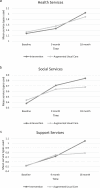Health Services Utilization in Older Adults with Dementia Receiving Care Coordination: The MIND at Home Trial
- PMID: 28083879
- PMCID: PMC5785326
- DOI: 10.1111/1475-6773.12647
Health Services Utilization in Older Adults with Dementia Receiving Care Coordination: The MIND at Home Trial
Abstract
Objective: To investigate effects of a novel dementia care coordination program on health services utilization.
Data sources/study setting: A total of 303 community-dwelling adults aged ≥70 with a cognitive disorder in Baltimore, Maryland (2008-2011).
Study design: Single-blind RCT evaluating efficacy of an 18-month care coordination intervention delivered through community-based nonclinical care coordinators, supported by an interdisciplinary clinical team.
Data collection/extraction methods: Study partners reported acute care/inpatient, outpatient, and home- and community-based service utilization at baseline, 9, and 18 months.
Principal findings: From baseline to 18 months, there were no significant group differences in acute care/inpatient or total outpatient services use, although intervention participants had significantly increased outpatient dementia/mental health visits from 9 to 18 months (p = .04) relative to controls. Home and community-based support service use significantly increased from baseline to 18 months in the intervention compared to control (p = .005).
Conclusions: While this dementia care coordination program did not impact acute care/inpatient services utilization, it increased use of dementia-related outpatient medical care and nonmedical supportive community services, a combination that may have helped participants remain at home longer. Future care model modifications that emphasize delirium, falls prevention, and behavior management may be needed to influence inpatient service use.
Keywords: Dementia; care coordination.
© Health Research and Educational Trust.
Figures

References
-
- Alexopoulos, G. S. , Abrams R. C., Young R. C., and Shamoian C. A.. 1988. “Cornell Scale for Depression in Dementia.” Biological Psychiatry 23 (3): 271–84. - PubMed
-
- Alzheimer's Association . 2015. “2015 Alzheimer's Disease Facts and Figures.” Alzheimer's & Dementia: The Journal of the Alzheimer's Association 11 (3): 332–84. - PubMed
-
- American Psychiatric Association . 2000. DSM‐IV‐TR: Diagnostic and Statistical Manual of Mental Disorders, 4th ed., text revision, pp. 739–99. Washington, DC: American Psychiatric Association.
-
- Anderson, W. L. , Feng Z., and Long S. K.. 2016. “Minnesota Managed Care Longitudinal Data Analysis” [accessed on August 11, 2016]. Available at https://aspe.hhs.gov/report/minnesota-managed-care-longitudinal-data-ana...
-
- Black, B. , Johnston D., Handel S., Morrison A., Robbins B., and Rye R.. 2008. Manual for the Johns Hopkins Dementia Care Needs Assessment (JHDCNA). Baltimore, MD: Johns Hopkins University.
Publication types
MeSH terms
Grants and funding
LinkOut - more resources
Full Text Sources
Other Literature Sources
Medical

